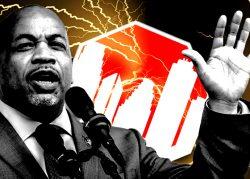Aspiring chefs in Los Angeles can toss aside their prized cast-iron skillets. The city aims to ban gas stoves in new residential developments.
Citing a global climate crisis, the Los Angeles City Council has passed a motion to banish most gas appliances in new construction, the Los Angeles Times reported.
The pending policy would result in new homes and businesses coming equipped with electric stoves, clothes dryers, water heaters and furnaces.
The decision by the nation’s second-largest city to choose electric over natural gas follows more than 50 California cities and counties that have adopted similar rules banning or discouraging gas hookups in new homes and businesses.
The vote “puts us in line with climate leaders across the country,” Councilmember Nithya Raman, the policy’s lead author, told the Los Angeles Times in an interview.
It’s also notable that the City of Los Angeles owns and operates a provider of electrical power––the Los Angeles Department of Water & Power––that has an essential monopoly within its jurisdiction and is currently the subject of a federal corruption probe.
Raman’s anti-gas motion, in any case, will require newly constructed buildings to be emissions-free, meaning they don’t add to the carbon dioxide pollution that’s generally seen as a key factor in climate change that has brought more destructive wildfires, more intense droughts and deadlier heat waves.
The zero-emission policy is likely to take effect in the next few years, although the timeline isn’t set.
The motion leaves the details to city agencies, directing them to draft a regulation and bring it back to the council for approval by the end of the year.
That doesn’t necessarily mean every new home and business will need to be zero-emission starting next year: there could be a phased-in compliance schedule for different types of buildings, such as restaurants that rely on gas stoves, Raman said.
A 50-unit, five-story affordable apartment building awaiting its first tenants in Mar Vista is the type of development the policy will promote, according to the Times. It has solar panels, and it’s all-electric — meaning no gas stoves, boilers or water heaters fueling the climate crisis.
“I want to do it on all of our new buildings,” said Tara Barauskas, executive director of Community Corp. of Santa Monica, the developer behind the affordable housing project, which finished construction this month. “We’re committed to all-electric.”
The likely outcome of L.A.’s new policy is that most new buildings will come equipped with electric heat pumps for space heating and cooling, plus electric water heaters and electric stoves, perhaps with induction cooktops that use magnets to heat food.
It’s part of a national movement, with the Biden administration preparing to distribute billions of dollars in federal funds to make homes more energy-efficient — including helping with the switch from gas to electric appliances.
Natural gas burned in homes and businesses accounts for about 10% of California’s planet-warming pollution. With the state targeting 100 percent clean electricity by 2045 — and L.A. aiming for 100 percent by 2035 — electric appliances could substantially reduce emissions over the long term.
Electrification can also slash indoor air pollution. Some researchers have found that children in homes with gas stoves face higher asthma risks, which the gas industry disputes.
The gas industry has fought electrification, which threatens to unravel its business model.
Companies such as Southern California Gas Co., the nation’s largest gas utility, argue gas is more reliable than electricity because it isn’t vulnerable to disruptions on the nation’s increasingly fragile power grid. They also note that electricity prices are rising dramatically across the Golden State.
In 2019, Berkeley, California, became the first municipality in the country to ban natural gas hookups. Last year, New York City moved to ban gas hookups in any new construction.
[Los Angeles Times] – Dana Bartholomew
Read more


